×


We have detected your country as:
Please click here to go to the USA website or select another country from the dropdown list.
by: Rev. Cheryl L. Hauer, International Development Director

Eddelene Marais/ bridgesforpeace.com
For most Christians, a list of the greatest men of the Tanakh [Gen.–Mal.] would include the likes of Moses the Lawgiver, David the King, Abraham the Father of both Jews and Christians, and the prophets Isaiah and Jeremiah.
Some might even include Nehemiah, cupbearer to the king of Babylon and rebuilder of the walls of Jerusalem. But few would include Ezra. Although the book that bears his name tells the story of his leadership and love for God and Torah [Gen.–Deut.], he just doesn’t seem important enough to be listed with the greats.
For Jewish lovers of the Scriptures, however, just the opposite is true. On their list of Bible heroes, Ezra is very close to the top. His importance to Jewish history is said to be second only to King David. Further, Judaism teaches, if God could not have given the Torah to the Jewish people through Moses, He would have done it through Ezra.
So, who was this man and what were his contributions to God’s kingdom that have made him so respected in the history and faith system of the descendants of Abraham, Isaac and Jacob? What kind of life did he lead that would have placed him on equal footing with Moses, the most revered individual in the annals of Judaism? And what can we learn from his life, from the courage he displayed as a leader, from the Scriptures that he penned, and from his unwavering, passionate commitment to the Lord and His Word?
 Life in Exile
Life in ExileIn order to better understand Ezra and his respected position among Israel’s fathers, we must first look at life in the oldest on-going diasporic community in the world: Babylon. From the first dispersion at the hands of King Nebuchadnezzar in 597 BC, to the siege of Jerusalem and destruction of Solomon’s Temple in 586 BC to the decree of King Cyrus in 538 BC, which allowed the captives to return to Jerusalem, the people of Israel lived separated from their Land and their heritage.
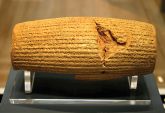
The Cyrus Cylinder, a contemporary cuneiform script proclaiming Cyrus as legitimate king of Babylon. www.mikepeel.net/wikipedia.org
Archaeological discoveries over the past century have shed light on the lives of these exiles through cuneiform tablets unearthed in Iraq and a more recent trove of documents that had been collected by Saddam Hussein. Through these discoveries, experts have been able to piece together a picture of life in exile, including business deals, land purchases and even tax records. Some date as far back as a mere five years after the first dispersion and record a supply of oil delivered to “Jehoiachin, king of Judah and his five sons.”
Other documents record dozens of Jewish names and even a community called the City of Judah, a direct reference to Jerusalem. Unlike the Assyrian exile in which the conquering kings were determined to assimilate the Jewish population, the Babylonians took a very different, hands-off approach. The Jewish people were allowed to live together in their own ethnic communities, following their own traditions and determining for themselves a way of life in exile that would honor the God of their fathers. In Ezra 2:1, the author speaks of the return of the captives to their homeland of Israel: “Now these are the people of the province who came back from the captivity, of those who had been carried away, whom Nebuchadnezzar the king of Babylon had carried away to Babylon, and who returned to Jerusalem and Judah, everyone to his own city.”
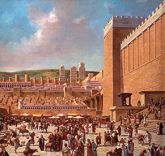 A further reading reveals that those whose families were associated with the Temple in Jerusalem before the exile now identified themselves as priests, singers, gatekeepers and Temple servants. Others organized themselves by their families’ towns of origin. Clearly, their history and traditions had not been forgotten. They had remained alive and relevant through the years of captivity.
A further reading reveals that those whose families were associated with the Temple in Jerusalem before the exile now identified themselves as priests, singers, gatekeepers and Temple servants. Others organized themselves by their families’ towns of origin. Clearly, their history and traditions had not been forgotten. They had remained alive and relevant through the years of captivity.
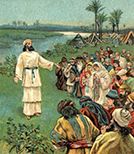 Prior to the destruction of the Temple, life in Israel was life lived in the presence of God, regardless of political turmoil or social upheaval. He had repeatedly promised that He had chosen Zion as His dwelling place, that He had placed His name there forever, that His love for His people and the Land was everlasting, that He would never leave nor forsake them. To live in Jerusalem meant that the beauty of the Temple, the smell of its incense, and the draw of its spirituality were constant companions. Zion was God’s home, a place where miracles were common and life revolved around Him and His relationship with His people.
Prior to the destruction of the Temple, life in Israel was life lived in the presence of God, regardless of political turmoil or social upheaval. He had repeatedly promised that He had chosen Zion as His dwelling place, that He had placed His name there forever, that His love for His people and the Land was everlasting, that He would never leave nor forsake them. To live in Jerusalem meant that the beauty of the Temple, the smell of its incense, and the draw of its spirituality were constant companions. Zion was God’s home, a place where miracles were common and life revolved around Him and His relationship with His people.
So as helpful as the archaeological evidence is, it will never communicate the pain and sense of loss these displaced persons felt as they were forced into exile. They had lost it all. Gone were God’s covering and His presence that they had taken for granted, and even rejected. Psalm 137 gives us a glimpse of their agony of soul:
“By the waters of Babylon, there we sat down and wept, when we remembered Zion. On the willows there we hung up our lyres. For there our captors required of us songs, and our tormentors, mirth, saying, ‘Sing us one of the songs of Zion!’ How shall we sing the Lord’s song in a foreign land? If I forget you, O Jerusalem, let my right hand forget its skill! Let my tongue stick to the roof of my mouth, if I do not remember you, if I do not set Jerusalem above my highest joy!” (Ps. 137:1–6 ESV).
In addition to the unspeakable horror of watching their holy city razed, their Temple destroyed, and the best and brightest among them dragged away in chains, the people of Israel were struck with the realization that they had no one to blame but themselves. Once in Babylon, the rabbis and sages encouraged them to accept responsibility for the disaster of the exile. It was their own sin that had brought this catastrophe on the nation. They had betrayed the Lord, scorned His prophets, disobeyed His commandments and embraced other gods. What were they to expect?
Yet, it was in the midst of their guilt and despair that the Lord sent a message of deliverance. If they would but turn back to the God of their Fathers, He would hear. The prophets Isaiah, Jeremiah and Ezekiel brought words from heaven that the exiles would once again be regathered, that their hearts would be purified and their kingdom reestablished. They would again walk the hills and valleys of Judea; they would indeed live in the Land and feed on faithfulness.
 Separated from their Land, devoid of the Temple, stripped of their freedoms, these new captives turned their hearts to God and cried out to Him for deliverance, a deliverance that was promised, but decades in coming. While they waited, it was critical that they look back to their Mosaic foundations and cling to God’s covenant promises to keep themselves from disappearing as a people. But instead, as time passed, they grew complacent. Life in Babylon was certainly not perfect, but as the memories of Judah and Jerusalem faded, zeal for God began to dim as well.
Separated from their Land, devoid of the Temple, stripped of their freedoms, these new captives turned their hearts to God and cried out to Him for deliverance, a deliverance that was promised, but decades in coming. While they waited, it was critical that they look back to their Mosaic foundations and cling to God’s covenant promises to keep themselves from disappearing as a people. But instead, as time passed, they grew complacent. Life in Babylon was certainly not perfect, but as the memories of Judah and Jerusalem faded, zeal for God began to dim as well.
Zerubbabel, a prince of Judah in Babylon, was able to stir the hearts of the captives for a time, reminding them of God’s promises. He set out for Jerusalem with 10,000 of his countrymen who, in the face of great hardship, began the rebuilding of the Temple. But eventually they grew tired of the constant opposition and failed in their task. “Thus the work of the house of God which is at Jerusalem ceased, and it was discontinued until the second year of the reign of Darius king of Persia” (Ezra 4:24).
God needed a very special man to be His messenger of deliverance to the Jewish people, a man of passion and integrity, a charismatic man who would capture the hearts of the exiles, a man of wisdom who would inspire the Jews of Babylon to love and serve the Lord. That man was Ezra.
Ezra’s father Seraiah and his mother were among those taken captive to Babylon, and he was born in exile. He was a member of a priestly family that included Eleazar, Phineas, Zadok and Aaron, and was the great-grandson of Hilkiah, the high priest when Josiah was king of Judah. Clearly his family was steeped in knowledge of the Torah and in the traditions of their fathers that were handed down from Moses himself. Ezra would have been raised to love and fear God, to seek after righteousness, and to remain faithful to the Lord despite the challenges of life in the Diaspora. His life was also profoundly affected by his teacher, Baruch ben Neriah who was the scribe and assistant to the prophet Jeremiah. He was a man of incredible life experience and scholarship, who had himself been influenced by Jeremiah’s passion for the Holy One.
As Ezra matured, the book that bears his name tells us that he found spiritual strength through prayer and fasting. God recognized him as a man of sound judgment, his book says, and a conscientious man whose principles led him to stand fast against sin. He had a passionate love for God’s Word and devoted himself not only to studying it, but to teaching others to do the same.

Kathy DeGagne/ bridgesforpeace.com
Ezra knew that straying from the Torah would bring death to his people and he committed himself to their preservation. As a priest, scribe and religious leader, his influence not only profoundly impacted the Judaism of his day, but changed its face for all of history. Nothing was more important than reviving a love for God and His Word, and to that end, Ezra oversaw the establishment of a system of yeshivot (academies for the study of Torah) in Jewish communities across his diasporic home. His faithful and thorough teaching of the Tanakh has earned him a place in history as the one who removed the Scripture from the monopoly of the priesthood and placed it in the hands and the hearts of the people.

TischenkoIrina/shutterstock.com
Ezra is credited with devising the concept of the synagogue, a house of study, as well as a center of worship and community activity. By profession, he was a scribe, and it is said he created the square letters that are today a standard part of Hebrew script. He was the most highly respected scholar in all of Babylon, and he was responsible for the final redaction of the Torah as well as the formalizing of the annual Torah reading schedule that is used to this day. He is also recognized as the founding father and leader of the Great Assembly, a council of 120 elders and sages that included Nehemiah, Daniel, Haggai, Zechariah and Malachi. The Assembly constituted the ultimate religious authority for the Jewish people at the onset of the Second Temple Period and was the forerunner of the Sanhedrin.
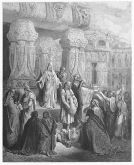
In 457 BC, Ezra led a group of exiles to Jerusalem to continue the rebuilding of the Temple. Nicku/shutterstock.com
Ezra’s contributions to God’s kingdom don’t end in Babylon. In 457 BC, he led a group of exiles to Jerusalem to continue the rebuilding of the Temple. His life of integrity and righteousness had not only gained him favor within the Jewish community, but also in the eyes of King Artaxerxes who offered him a life of ease and wealth should he choose to remain in Babylon. But Ezra was determined to fulfill the dream of making his home in the land of Israel, and the king not only granted him permission to make the journey, but appointed him to a high ranking position with the authority to establish a civil legal system in Jerusalem.
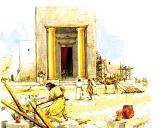 Once there, he was distressed to find a people who had strayed far from the God of their fathers. He found few priests and religious leaders, Scripture says. Many of the residents of Jerusalem were given over to pagan practices, having disobeyed God’s command and taken foreign wives. The children of those unions were being raised with virtually no understanding of the great spiritual heritage of Israel. Ezra was deeply grieved, but immediately began the rebuilding of the Temple. Gathering the few faithful leaders he could find into a cohesive team, they worked to inspire the community with the same love of Torah that Ezra had communicated to the captives in Babylon. He reinstated laws that had been forgotten in the exile and established new customs that are a part of Jewish practice to this day. Upon the arrival of Nehemiah, the two worked together to rebuild the shattered walls of the city, as well as the shattered lives of its residents.
Once there, he was distressed to find a people who had strayed far from the God of their fathers. He found few priests and religious leaders, Scripture says. Many of the residents of Jerusalem were given over to pagan practices, having disobeyed God’s command and taken foreign wives. The children of those unions were being raised with virtually no understanding of the great spiritual heritage of Israel. Ezra was deeply grieved, but immediately began the rebuilding of the Temple. Gathering the few faithful leaders he could find into a cohesive team, they worked to inspire the community with the same love of Torah that Ezra had communicated to the captives in Babylon. He reinstated laws that had been forgotten in the exile and established new customs that are a part of Jewish practice to this day. Upon the arrival of Nehemiah, the two worked together to rebuild the shattered walls of the city, as well as the shattered lives of its residents.
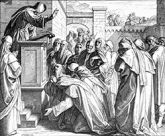 It was here that Ezra’s wisdom and foresight changed the course of Jewish history. The book of Nehemiah tells us that Ezra stood on a wooden platform in front of thousands of Israelites with the Book of the Law, or the Torah, in his hands. Men, women and children, all those who were able to understand what was being said, waited with bated breath for the word of the Lord to be spoken. And as Ezra began to read, the people responded “as one.” Raising their arms to heaven, they cried, “Amen and amen” (Neh. 8:6). Bowing with their faces to the ground, they wept, and stood again. For six hours, Ezra read the Torah aloud while thousands of people listened with rapt attention, and the final result was a people transformed. Here, history says, the Jewish people were moved to individual and collective repentance and were, at long last, reunited with their God and His Word.
It was here that Ezra’s wisdom and foresight changed the course of Jewish history. The book of Nehemiah tells us that Ezra stood on a wooden platform in front of thousands of Israelites with the Book of the Law, or the Torah, in his hands. Men, women and children, all those who were able to understand what was being said, waited with bated breath for the word of the Lord to be spoken. And as Ezra began to read, the people responded “as one.” Raising their arms to heaven, they cried, “Amen and amen” (Neh. 8:6). Bowing with their faces to the ground, they wept, and stood again. For six hours, Ezra read the Torah aloud while thousands of people listened with rapt attention, and the final result was a people transformed. Here, history says, the Jewish people were moved to individual and collective repentance and were, at long last, reunited with their God and His Word.
In addition to all his other accomplishments, Ezra is also known for his contributions to the rich body of literature that came from the Jewish community in Babylon. Bible scholars credit him with having written parts of the books of Jeremiah, 2 Kings, 2 Chronicles, all of Ezra and sections of Nehemiah. Many of those same scholars believe that Ezra’s greatest writing achievement, however, was Psalm 119.
A wisdom psalm, this beautiful poem is an exhaustive and passionate song of the heart, and it is easy to see in it the love that Ezra had for the Word of God. As an acrostic, it is sometimes called the “Song of Eights.” Each of the 22 letters of the alphabet begins a section of eight verses, creating 176 of the most fervent verses in all of the Bible, expressing ardent love for the Creator and zeal for righteousness. There are also eight specific words of God’s direction used by the author, one of which appears in every verse. They are Torah (often translated law), testimonies, promises, precepts, statutes, commandments, judgments and word.
As a man of wisdom and calling, Ezra was acutely aware that years of exile had dulled the spiritual senses of God’s people. Even for those who had returned to Israel, constant opposition and hardship had caused discouragement and defeat. Without the Temple and its specific system of worship, the Jewish people were like a ship without a rudder. Ezra was determined to bring them back on course by filling their hearts with love for Torah. That passion is clearly seen in Psalm 119.
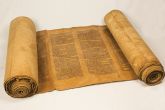
Torah scroll/ The Green Collection
In it, we are reminded that the Torah, the instruction and direction of the Lord, is not a burden or a curse; it is gift to be embraced and cherished. It is to be applied to our daily lives, but also to the destiny of the nation of Israel. The introductory notes on Psalm 119 in the The Nelson Study Bible: New King James Version say this:
“The law (Torah) is specific and general, directive and restrictive, liberating and opening, gracious and solemn—it is as complex as the Lord who gave it…The psalmist cannot stop praising God for His mercy and goodness in providing His people with instructions for living.”
In verses 17–22, scholars see Ezra’s allusion to life in exile. Because of the arrogance of God’s people in turning from Him, He was forced to rebuke them by sending them into captivity among a people whose leadership would at times mistreat and malign them. Commitment to the Word of God would be their only path to redemption. Verse 92 says it well: “Unless Your law had been my delight, I would then have perished in my affliction.”

igorstevanovic/ Shutterstock.com
The psalmist also recognized the importance of instilling in the younger generation an understanding of their rightful place as God’s covenant people. As he set about building yeshivot across Babylon, these verses must have resonated in his heart: “How can a young man cleanse his way? By taking heed according to Your word” and “Your word I have hidden in my heart, that I might not sin against You” (Ps. 119:9, 11).
As line after line declares the wretchedness of mankind and their dire need for God’s mercy, the psalmist never forgets to praise the Lord for the benefits of passionate commitment to Torah. Another series of eight words found throughout the psalm—revival, rejoicing, strength, life, help, understanding, wisdom and hope—all appear as the natural outgrowth of living a life of obedience. For a people living in captivity, true freedom would be found in obeying God’s instruction.
Psalm 119 is, of course, not just important to the Jewish people. It has been dearly loved by Christians throughout the ages. Countless sermons have been preached on it, commentaries written about it, and many a Bible-loving Christian has wept and prayed over its words, feeling the cry of Ezra’s heart resonate with their own. Perhaps in its impassioned words, we can find direction for our own lives.
Passion for the Word: Another psalmist of renown, King David, spoke with the same passion as Ezra when he penned Psalm 19: “The law of the Lord is perfect…the testimony of the Lord is sure…the statues of the Lord are right…the commandment of the Lord is pure…the fear of the Lord is clean…the judgments of the Lord are true and righteous…” (vv. 7–9). Together, David says, they are more to be desired than fine gold and are sweeter than honey (v. 10). We live in a day in which love for the Scriptures seems to be waning. Fewer people are reading their Bibles, and a large percentage of Christians no longer find absolute truth or direction for life among its pages. Like Ezra, we must cling to the revealed Word of God and help others to do the same.

Paul Matthew Photography/ shutterstock.com
Preparation and Positioning: We, too, are sojourners in a foreign land, the Writings of the Apostles tell us. Our confidence to live and courage to persevere are found, like the exiles of Ezra’s day, in the Word of God. Ezra clearly understood the need to prepare in order to be positioned by the Lord to fulfill the calling on his life:
“For Ezra had prepared his heart to seek the Law of the Lord, and to do it, and to teach statutes and ordinances in Israel” (Ezra 7:10).
In 2 Timothy we read: “All Scripture is given by inspiration of God, and is profitable for doctrine, for reproof, for correction, for instruction in righteousness, that the man of God may be complete, thoroughly equipped for every good work” (2 Tim.3:16–17).
Here the Apostle Paul echoes Ezra as he stresses the preeminence of the Scriptures. God is their Author and in them we find truth. But, Paul further says the study of Scripture will make us complete, which in the Greek means “capable or proficient.” We will be equipped and made fully prepared for the life God desires us to lead. As with Ezra, each of us needs to be fully prepared in order for the Lord of Hosts to position us to fulfill His plan for each of our lives.
Purity of Heart: Violence and vulgarity seem to assail us from every direction today through movies, television, the internet and ever-changing social norms. Like the captives in Ezra’s day, we are surrounded by those who despise the Lord and make constant sport of His precepts. For many Christians, especially among young people, the pull of the world is just too strong, and the line between righteousness and unrighteousness gets increasingly fuzzy. Like the exiles, spiritual senses are becoming dull.

Angie Sidles/shutterstock.com
The answer for us today is the same as it was millennia ago. The courage to stand against a tide of unrighteousness, the strength to make right choices, the resolve to faithfully follow the Lord and cling to His precepts are found in our commitment to revere and obey God’s Word.
Ezra found favor in his ancient world because of his purity of heart, because he was prepared to be positioned, because he was passionate to follow God’s instructions. May that be the hallmark of the Church and each of us as well, as we sojourn together in these amazing days.
Bullock, C. Hassell. Encountering the Book of Psalms. Grand Rapids Michigan: Baker
Academics, a division of Baker Book House, 2001.
Feuer, Rabbi Avrohom Chaim; Scherman Rabbi Nosson (eds.).Tehillim/Psalms (Artscroll
Tanach Series). New York: Mesorah Publications, Ltd., 1995.
Nelson, Thomas. The Nelson Study Bible: New King James Version. Thomas Nelson
Publishers, 1997.
Rabinowitz, Rabbi Yosef. The Book of Ezra (Artscroll Tanach Series). New York: Mesorah
Publications, Ltd., 2010.
Rozenberg, Martin S.; Zlotowitz, Bernard M. The Book of Psalms. New Jersey, USA:
Jason Aronson Inc, 1999.
Vine, W.E.; Unger, Merrill F.; White, William Jr. (eds.). Vine’s Expository Dictionary of
Biblical Words. Nashville, TN: Thomas Nelson Publishers, 1985.
All logos and trademarks in this site are property of their respective owner. All other materials are property of Bridges for Peace. Copyright © 2024.
Website Site Design by J-Town Internet Services Ltd. - Based in Jerusalem and Serving the World.